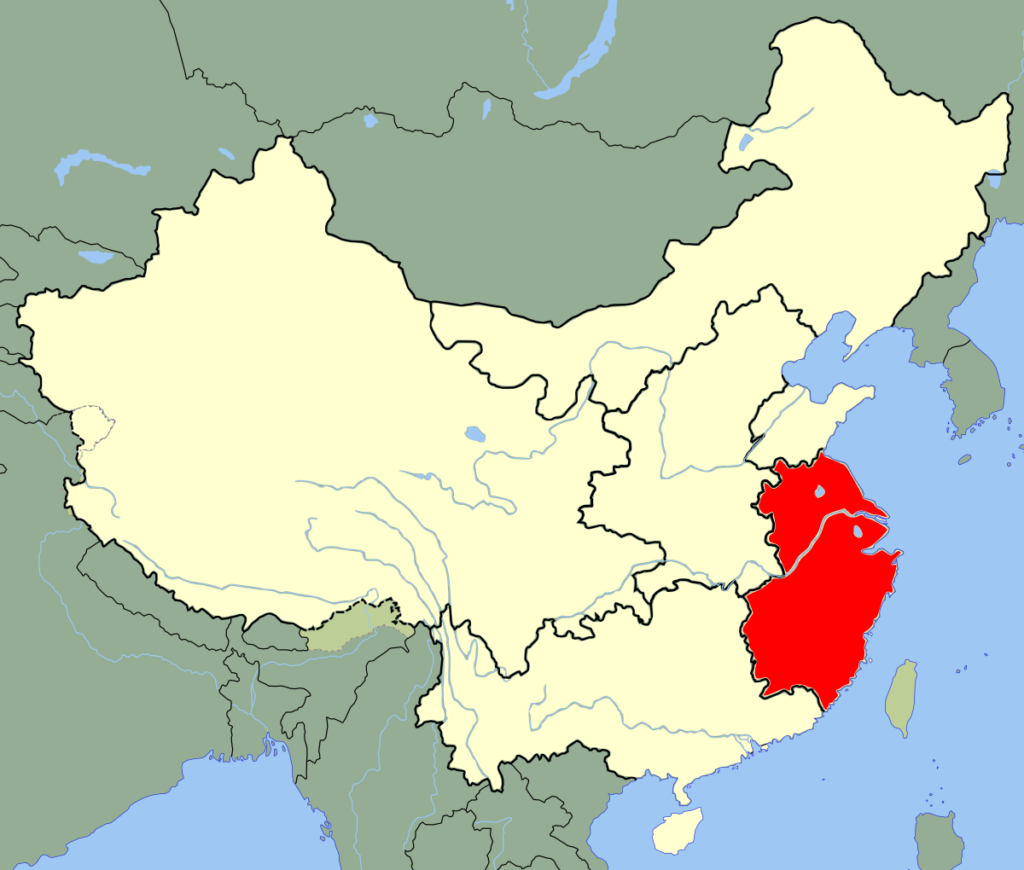
STRATEGIC ASSESSMENT. Indonesian Ambassador to the United States Rosan Roeslani, in a written statement said two U.S. Congress members, Senator Jeff Merkley and Senator Chris Van Hollen, will visit Indonesia in April to strengthen economic relations between the two countries.

He said the two senators, along with four other U.S. Congress members, seek to express support for and to strengthen the U.S.-Indonesia strategic partnership, including a stronger U.S. economic presence in Indonesia.
Coordinating Maritime Affairs and Investment Minister Luhut Pandjaitan said that the principles of equality and fairness should be the basis for cooperative relationship between countries, so that no one should feel superior to the other.
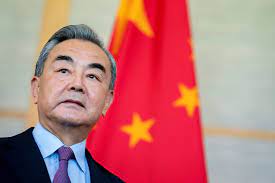
“This is the case with the relationship between Indonesia and China, which is based on equal friendship and mutual trust,” Luhut said on his Instagram post on Wednesday with photos of him meeting Chinese diplomat Wang Yi.
Luhut met with Director of the Foreign Affairs Commission Office of the Communist Party of China (CPC) Wang Yi during the third Meeting of the China-Indonesia High-level Dialogue Cooperation Mechanism. Wang said China is ready to work with Indonesia to strengthen overall strategic coordination, further deepen new patterns of cooperation covering political, economic, cultural and maritime fields, and jointly promote development the two countries and the prosperity of the region. Wang said that this year marked the 10th anniversary of the Belt and Road Initiative (BRI) and China is ready to work with Indonesia to advance cooperation under BRI at the next stage.
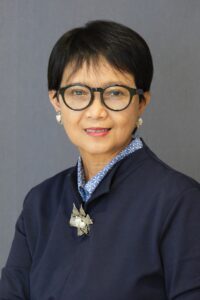
After over three months and hundreds of closed-door meetings since the start of Indonesia’s chairmanship of ASEAN, “everything is on the right track,” said Foreign Minister Retno L.P. Marsudi, as if to compensate for the apparent radio silence that has obscured progress on issues of regional concern. The minister’s statement, made amid fast-changing realities witnessed by Southeast Asian nations in past months, reaffirmed that Jakarta’s focus remains centered on the three pillars of its agenda: emphasizing ASEAN centrality, ensuring economic growth and implementing its Outlook on the Indo-Pacific (AOIP).
Minister Retno said that ASEAN chair Indonesia had been engaging with stakeholders to resolve the crisis in fellow member state Myanmar. She said Indonesia had been making some progress in relation to the aid provision by the ASEAN Coordinating Center for Humanitarian Assistance (AHA Center).
Pakistan and Indonesia strongly condemned an Israeli police raid on Palestinian worshippers at the Al-Aqsa mosque in occupied East Jerusalem, which resulted in injuries and large-scale arrests.

“This act has really hurt the feelings of Muslims around the world, was a real violation of the sanctity of Al-Aqsa, and will further escalate conflict and violence.” Jakarta urged the UN and the international community to “immediately take concrete steps to stop and end the various violations committed by Israel against Al-Aqsa.”

The government and some of the country’s largest Muslim organizations have responded to the violence inflicted by Israeli security forces at Jerusalem’s Al-Aqsa Mosque, expressing “strong condemnation” accompanied by loud calls to the United Nations to implement sanctions. Israel’s actions, they said, have injured the “feelings of Muslims worldwide” as well as escalated conflict in the month of Ramadan.
Israeli forces clashed with Palestinians worshiping at the Al-Aqsa mosque, prompting the arrest of over 300 people and escalating tensions, spreading to the Gaza border where thousands rallied in protest, Reuters reported.
On April 5, the Indonesian Environment and Forestry Ministry added its signature, alongside that of the U.S. Environmental Protection Agency (EPA), to a memorandum of understanding (MoU) aimed at strengthening bilateral cooperation on environmental protection and climate action.
The MoU was signed by EPA Administrator Michael Regan last week in Washington, D.C., and today by Indonesian Environment and Forestry Minister Siti Nurbaya at the MoEF headquarters in Jakarta. The signing ceremony was attended by the U.S. Ambassador to Indonesia Sung Y. Kim and Office of International Affairs Director Mark Kasman.
The MoU establishes a framework for collaboration on a range of environmental issues, such as climate change mitigation and adaptation, air quality management, water quality management, waste management, environmental education, environmental law enforcement, and circular economy approaches. The MoU also aims to promote technical exchanges and information sharing between the two countries.
Health Ministry Spokesperson Mohammad Syahril said the ministry was rearranging the health laboratory as an effort to transform health in Indonesia, starting from increasing the number of laboratories to the completeness of health service facilities and infrastructure in public health laboratories.
According to WHO recommendations, the Health Ministry determines the category for labs and increases their number. Health Minister Budi Gunadi Sadikin has asked the U.S. Centers for Disease Control and Prevention (CDC) to support the development of a national health lab in Indonesia in the form of partnerships and expert staff.
Minister Budi also asked USAID to sponsor cooperation between hospitals in Indonesia and hospitals in the United States (Boston Children, MD Anderson, Cleveland Clinic, Mayo Clinic, Joslin Diabetes, and UCLA).
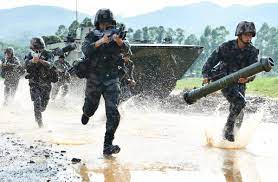
The Chinese People’s Liberation Army (PLA) Eastern Theater Command reported that China has resumed its Saturday-starting encirclement of Taiwan from all sides and via sea and air routes. This exercise involved aircraft carriers, unlike the one in August 2022. This exercise was a component of China’s protest against the meeting between U.S. House Speaker Kevin McCarthy and Taiwanese President Tsai Ing-wen in California.
The Joint Sword drills continue through Monday and were held in the north, south, and east of Taiwan, according to PLA’s Eastern Theater Command spokesperson Senior Colonel Shi Yi, and they were centered on sea-air operations around the island. This exercise involved the deployment of warships, fighter jets, helicopters, and aircraft carriers.
While China’s expressed intent to sign the protocol for ASEAN’s nuclear weapon free zone treaty should be supported, convincing other nuclear weapon states to follow suit may be a challenge, experts have said. So far, only China has asserted its willingness to sign the SEANWFZ Protocol, expressed during a recent meeting of the Chinese Foreign Minister Qin Gang with the ASEAN Secretary-General Kao Kim Houm.
Analysts say the nuclear subs might also complicate the issue of whether the United States and the United Kingdom, both nuclear weapon states recognized in the SEANWFZ Protocol, would be willing to sign the protocol. “lt would be in China’s interest if there was a protocol that banned nuclear weapons in the region,” Centre for Strategic and International Studies (CSIS) international relations researcher Andrew Mantong said.
However, convincing other nuclear weapon states would not be an easy task; as Andrew pointed out, the United States had expressed concern about the SEANWFZ Protocol limiting freedom of navigation. If there were any nuclear weapon states to sign the SEANWFZ Protocol, it would actually provide a capable regional process that would enact a nuclear weapon free zone based in ASEAN, he added.
The U.S. Navy said its guided-missile destroyer USS Milius conducted a navigational rights and freedoms mission in the South China Sea near the Spratly Islands. The announcement came as China’s military simulated precision strikes against Taiwan in military drills around the island amid growing tensions between China and the United States in the region.
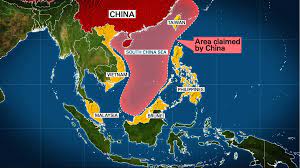
The U.S. Navy said the operation by the destroyer was consistent with international law. “At the conclusion of the operation, USS Milius exited the excessive claim area and continued operations in the South China Sea,” a U.S. Navy statement said. “This freedom of navigation operation upheld the rights, freedoms and lawful uses of the sea.”
China simulated “sealing off” Taiwan on a third day of wargames around the self-ruled nationalist island on Monday, as the United States deployed a naval destroyer into waters claimed by Beijing. China launched the exercises in response to Taiwan President Tsai Ing-wen’s meeting with U.S. House Speaker Kevin McCarthy last week.
After two days of exercises that included simulating targeted strikes on Taiwan and the encirclement of the island, the Chinese military said the war games also included “sealing” Taiwan off. A state media report said dozens of planes had practiced an “aerial blockade”. Taipei has condemned the drills, while Washington has called for restraint.
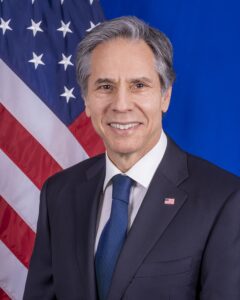
U.S. Secretary of State Antony Blinken will discuss growing military ties with the Philippines before heading to Vietnam and Japan days after a new flare-up of tensions with China over Taiwan.
The Philippines, Vietnam, and Japan all have longstanding territorial disputes with China that have grown more intense in recent years as Beijing flexes its muscle.
Last week, the Philippines announced four more military bases that U.S. forces will be able to use, including one on the northern Luzon island, just 400 kilometers from Taiwan — a stark shift from a previous push by Manila to improve ties with China.
After Thailand, the Philippines became the site for U.S. military exercises in Southeast Asia. The exercises in the Philippines began just one day after China’s encirclement and assault drills on Taiwan were concluded.
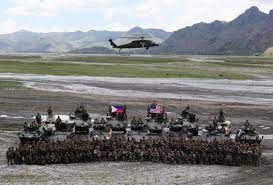
The joint exercise, codenamed Balikatan, was attended by 17,711 U.S., Filipino, and Australian troops. Washington deployed 12,200 troops to the April 11–28 exercise. Meanwhile, the Philippines only sent 5,400 troops to Balikatan, which is less than half the number of U.S. troops.
China will close its airspace for 30 minutes, citing the need to clean up debris left over from the satellite launch. Taiwan, Japan, and South Korea will continue to monitor this closure, Taiwanese National Intelligence Service Deputy Chief Yan Yu-hsien delivered the information to journalists in Taipei.
At first, China declared its intention to close its airspace from April 16–18. Taiwan, Japan, and South Korea, on the other hand, objected to this plan as the closure would disrupt smooth air travel between East Asia and Southeast Asia and vice versa.
ASEAN leader Indonesia has lent its voice in condemning junta-ordered airstrikes in Myanmar’s northwestern region of Sagaing, which reportedly killed up to 100 people and elicited a global outcry against continuing violence in the Southeast Asian nation.
Indonesia, which chairs the regional organization this year in its efforts to facilitate peace in Myanmar, strongly condemned the air strikes and called for an end to all forms of violence, “particularly the use of force against civilians”.
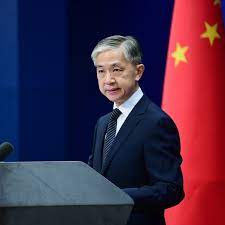
Chinese Foreign Affairs Ministry spokesperson Wang Wenbin in Beijing blamed the United States for the deteriorating relations between the two major economies in recent years. He urged the United States to stop interfering in domestic affairs and Chinese interests, especially related to the issues of Taiwan, Xinjiang, and Tibet.
According to media reports, the U.S. government tried to start high-level talks back with China, including rescheduling the visit of the U.S. Secretary of State Antony Blinken to Beijing which was delayed due to the incident of Chinese spy balloons.
ASEAN’s chairman’s statement to “strongly condemn” the Myanmar junta airstrike and call again for the full implementation of the Five-Point Consensus (FPC) came two days after the strike reportedly killed some 133 civilians, including women and children, Sagaing.
Activists and observers who have been kept in the dark on Indonesia’s recent efforts on the Myanmar crisis have started questioning Jakarta’s claim, made last week, that “everything is on track,” also noting the delay in ASEAN issuing its own statement.
However, Beijing has frozen diplomatic contact with Washington. “The United States must stop efforts that can damage the political foundation in bilateral relations,” Wang said in response to the U.S. request.
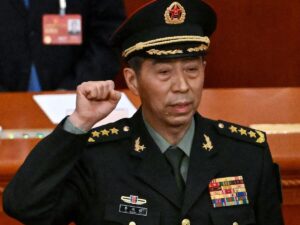
Chinese Defense Minister Gen. Li Shangfu will visit Russia next week for meetings with counterpart Sergei Shoigu and other military officials, China’s Defense Ministry said. Li’s visit underscores China’s strengthening engagement with Russia, with which it has largely aligned its foreign policy in an attempt to reshape the world order to diminish the influence of the United States and other Western democracies.





